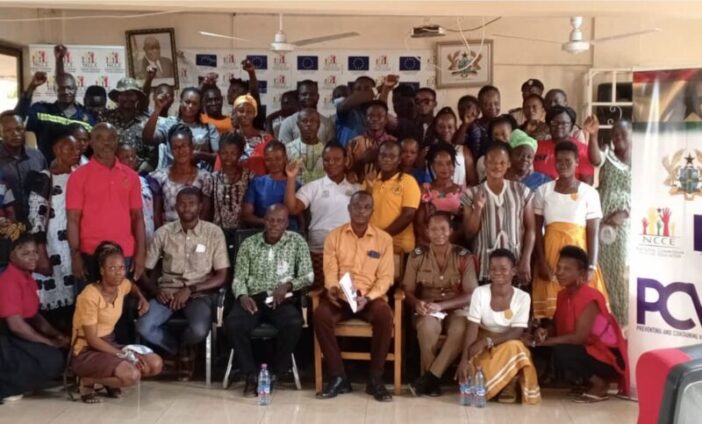The Deputy Upper West Regional Director of the National Commission for Civic Education (NCCE), John Yibile, has urged the youth to be vigilant, as violent extremists can be identified by their actions and behaviour in society.
He advised them to be wary of those they related to within society and to promptly report any suspicious characters or actions of people in their communities to the security agencies.
Mr Yibile said this at a day’s workshop for identifiable youth groups and associations in the Lawra Municipality, on preventing and containing violent extremism and promoting peace before, during, and after the Election 2024.
It was organised by the Lawra Municipal Directorate of the NCCE with funding from the European Union (EU) as part of the implementation of the “Preventing and Containing Violent Extremism (PCVE) action in Ghana” project.
Mr Yibile entreated the young people to always use the right structures in solving problems, rather than coercion and taking the law into their own hands as that could lead to chaos in societies.
Mr Jesurun Ninge Mornah, the Lawra Municipal Director of NCCE, observed that the youth was the most vulnerable group of people to violent extremism due to the high rate of unemployment and their political exuberance among others.
He said the workshop was to deepen the youth’s understanding of violent extremism and social cohesion in the fight against extremist activities in the municipality and the nation in general.
“This engagement is to enhance your capacity to identify some signs of persons who are likely to radicalise young people and also guide you to identify some tips on crime prevention and creating awareness on peace-building mechanisms for countering violent extremism,” Mr Mornah explained.
He commended the EU for its support in preventing violent extremism in the Municipality and the region in general because violent extremism was a global concern.
Mr Debpuur Jacob of the Narcotics Control Commission said activities of violent extremists were influenced by the abuse of narcotics, and advised the participants against abusing drugs to avoid falling victim to the menace.
John Bedi, the Director of the Commission on Human Rights and Administrative Justice (CHRAJ), said that preventing violent extremism required a multi-faceted approach involving government, civil society, communities and individuals for effective action.
He explained that addressing issues of socio-economic grievances, poverty, inequality, and unemployment were potent ways to prevent violent extremism.
The youth pledged to be ambassadors and advocates for peace and to contribute to preventing violent extremism.
They also promised to collaborate with stakeholders in their respective communities and institutions, to form peace clubs to campaign against violent extremism.
Latest Stories
-
We are witnessing systematic and calculated assault on the judiciary – Afenyo Markin roars
1 minute -
Minority leader accuses NDC gov’t of creating high unemployment
35 minutes -
GBA is gradually becoming a wing of the NPP – NDC’s Gideon Tetteh
49 minutes -
Mrs. Augusta N’ameley Odoteye (Née Ribeiro)
1 hour -
Ghanaian workers cannot “reset” with our meagre salaries – TUC to Mahama
1 hour -
Investments in exploration activities increased by 181% to $90m in 2024
2 hours -
Galamsey fight is complex, but I say Aluta continua – President Mahama
2 hours -
Education minister inaugurates KNUST Governing council, urges focus on STEM education
3 hours -
“Stop feeling sorry for yourselves” – Akufo-Addo urges NPP after election defeat
3 hours -
Guiness to launch ‘Smirnoff in the Mix’
3 hours -
Gold price falls almost 2% to two-week low
3 hours -
I did not kid myself that I would win galamsey fight in 4 months – President Mahama
3 hours -
I’m proud NPP lost 2024 election; I’ll quit politics if… – Hopeson Adorye
3 hours -
Manasseh Azure writes: My mixed reaction to President Mahama’s Supreme Court nominations
4 hours -
My administration is committed to decentralising opportunities – Mahama tells workers
4 hours

